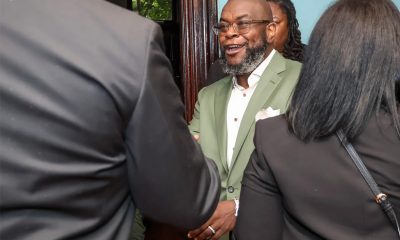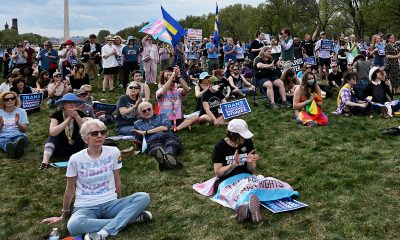News
Putin: Gays will not suffer discrimination during Olympics
Russian LGBT rights advocate dismissed comments


Queer Nation members protest outside a U.S. Olympic Committee press conference in Times Square on Oct. 29. (Photo by Scott Wooledge)
Russian President Vladimir Putin on Oct. 28 said gays and lesbians will not suffer discrimination during the upcoming Winter Olympics in Sochi.
“On my own and on your behalf, I have assured Mr. (International Olympic Committee) President (Thomas Bach) that we will do our best, and our athletes and fans will do their best too, so that both participants and guests feel themselves comfortable at [the] Sochi Olympics regardless of their ethnicity, race or sexual orientation,” Putin said during a Sochi press conference that Bach attended, as the Associated Press reported. “I would like to underline that.”
Putin’s comments come amid lingering outrage over Russia’s LGBT rights record that threatens to overshadow the Sochi games that will take place in February.
Putin in June signed a bill into law that bans gay propaganda to minors. A second statute that bans foreign same-sex couples and any couple from a country in which gays and lesbians can legally marry from adopting Russian children.
LGBT advocacy groups are among those that face fines under a 2012 law that requires non-governmental organizations that receive funding from outside Russia to register as a “foreign agent.”
“It is hard to imagine how people can be welcomed equally regardless of sexual orientation when such a law… is in place,” Russian LGBT rights advocate Anastasia Smirnova said during an Oct. 29 conference call with reporters that All Out hosted as she discussed Putin’s comments and the gay propaganda law he signed.
U.S. Rep. Ileana Ros-Lehtinen (R-Fla.) and more than three dozen other members of Congress earlier in October asked U.S. Olympic Committee CEO Scott Blackmun to outline how he plans to ensure the safety of gay American athletes who plan to compete in the Sochi games
Author Dan Savage and playwright Harvey Fierstein are among those who have called for a boycott of the Sochi games over Russia’s LGBT rights record.
Two dozen members of Queer Nation, an LGBT advocacy group, on Tuesday protested outside a Times Square press conference at which the U.S. Olympic Committee officially launched a 100-day countdown to the Sochi games. Activists with the same organization in September interrupted the Metropolitan Opera’s opening night gala to protest Russia’s gay rights record.
“The USOC and the international community should not legitimize Russia’s violations of fundamental human rights by holding the games in that country,” Queer Nation member Duncan Osborne said.
Blackmun on Oct. 11 said Russia’s gay propaganda law is “inconsistent with the fundamental principles of the Olympics and Paraolympic movements.” The USOC Board of Directors the day before voted to add sexual orientation to its non-discrimination policy.
The IOC has repeatedly maintained it has received assurances from the Kremlin that the gay propaganda ban will not affect athletes and others who plan to travel to Sochi, even though Russian officials have previously said the statute will apply to those who go to the games. Bach in September stressed during a speech he delivered in Greece before the lighting of the Olympic flame that Olympic values include “respect without any form of discrimination.”
Bach is scheduled to meet with Russian LGBT rights activists at the IOC’s headquarters in Lausanne, Switzerland, this week. Smirnova said he declined to meet with them during his most recent trip to the Olympic host city.
“It is a shame that despite the advanced notice, the president couldn’t find the time to meet with representatives of the coalition of LGBT organizations,” she said.
Argentina
LGBTQ seniors in Argentina face uncertain future
President Javier Milei’s policies have disproportionately impacted retired pensioners

Editor’s note: International News Editor Michael K. Lavers will be on assignment in Argentina and Uruguay through April 12.
Argentina has undergone significant changes in its economic and social policies since President Javier Milei’s inauguration in December 2023. These changes have had a significant impact on various sectors of society, especially retirees and the LGBTQ community.
Mercedes Caracciolo, a 79-year-old sociologist and lesbian activist, shared her experience with the Washington Blade on how the new measures have affected her quality of life.
“Since Milei’s arrival in government, which began with a brutal devaluation, I am more careful in my spending than I was before,” she said.
Although Caracciolo has additional income from rental properties, she recognizes the situation is much more critical for those who exclusively depend on a pension.
With more than 7 million people receiving pensions, many find themselves “scratching the poverty line” due to the loss of purchasing power. The libertarian government’s economic policies have drastically affected their welfare, leading to a wave of protests across the country.
The reduction of social programs and the lack of LGBTQ-specific public policies have deepened the difficulties that seniors already face. The loss of economic stability particularly affects those who have historically lived on the margins, with fewer job opportunities and limited access to a decent retirement. Many older LGBTQ people, who have spent their lives unable to form traditional families, now find themselves without a support network and with an increasingly less present State.
The advance of conservative discourses has also generated a climate of insecurity and fear.
“There is no more sense of security and stability in old age,” Graciela Balestra, a psychologist who is the president of Puerta Abierta a la Diversidad, the first home for LGBTQ seniors in Argentina, explained. “Many LGBTQ+ retirees fear that there are fewer and fewer rights. They see what is happening in Argentina and globally with the advance of the right wing, and they feel that what they worked so hard to achieve is in jeopardy.”
In addition to economic difficulties, the LGBTQ community has faced additional challenges.
Caracciolo noted many supportive spaces have had their government subsidies reduced or eliminated, weakening community networks essential to the well-being of LGBTQ seniors.
“Community networks are also weakened because many of them require state support for certain types of expenses,” she noted.
Balestra warned about the psychological impact.
“Obviously it impacted mental health. There is much more anxiety, there is fear. People who say ‘I’m afraid they’ll kill me’ or ‘I’m afraid to show myself,'” she said. “Before, they used to walk down the street holding hands with their partner, and now they don’t do it anymore. A lot of hopelessness.”
For Balestra, the concern goes beyond the LGBTQ community.
“The economic issue, the rights issue, the fear that something similar to the dictatorship will return. All of this is very scary. And besides, the hopelessness of believing that this is going to continue, that it is not going to change even in the next elections,” she said.
Civil society organizations have denounced an “adjustment” in policies related to gender and diversity that Milei’s government has undertaken. Pride marches in Argentina have become a stage for protests against the president’s policies, especially over his speeches that activists consider hateful towards the LGBTQ community.
Balestra stresses the fear is not only individual, but collective.
“Human rights no longer exist anywhere, women no longer have the place they used to have, they are once again objectified, machismo is on the rise again,” she said. “This brings a lot of despair to older people.”
Despite the climate of uncertainty, Balestra emphasizes resistence forces are still in force.
“We continue working, as always,” she said. “For 25 years at Puerta Abierta we have been doing reflection groups, cultural workshops, social meetings, all with respect to being able to make LGBT people aware of their rights. We never stop meeting, but lately we are talking more and more about these things that we had already left a little behind. The issue of coming out, fear, visibility. Now we have to talk about it again.”
Federal Government
Mass HHS layoffs include HIV/AIDS prevention, policy teams
Democratic states sue over cuts

Tuesday began a series of mass layoffs targeting staff, departments, and whole agencies within the U.S. Department of Health and Human Services under Secretary Robert F. Kennedy Jr., who reportedly plans to cut a total of 10,000 jobs.
On the chopping block, according to reports this week, is the Office of Infectious Disease and HIV/AIDS Policy. A fact sheet explaining on the restructuring says “a new Administration for a Healthy America (AHA) will consolidate the OASH, HRSA, SAMHSA, ATSDR, and NIOSH, so as to more efficiently coordinate chronic care and disease prevention programs and harmonize health resources to low-income Americans.”
The document indicates that “Divisions of AHA include Primary Care, Maternal and Child Health, Mental Health, Environmental Health, HIV/AIDS, and Workforce, with support of the U.S. Surgeon General and Policy team.”
“Today, the Trump administration eliminated the staff of several CDC HIV prevention offices, including entire offices conducting public health communication campaigns, modeling and behavioral surveillance, capacity building, and non-lab research,” said a press release Tuesday by the HIV + Hepatitis Policy Institute.
The organization also noted the “reassignments” of Jonathan Mermin, director of the National Center for HIV, Viral Hepatitis, STD, and TB Prevention, and Jeanne Marrazzo, director of the National Institutes of Health’s National Institute of Allergy and Infectious Diseases. Both were moved to the Indian Health Service.
“In a matter of just a couple days, we are losing our nation’s ability to prevent HIV,” said HIV + Hepatitis Policy Institute Executive Director Carl Schmid. “The expertise of the staff, along with their decades of leadership, has now been destroyed and cannot be replaced. We will feel the impacts of these decisions for years to come and it will certainly, sadly, translate into an increase in new HIV infections and higher medical costs.”
The group added, “We are still learning the full extent of the staff cuts and do not know how the administration’s announced reorganization of HHS will impact all HIV treatment, prevention, and research programs, including President Trump’s Ending the HIV Epidemic initiative,” but “At the moment, it seems that we are in the middle of a hurricane and just waiting for the next shoe to drop.”
A group of 500 HIV advocates announced a rally planned for Wednesday morning at 8 a.m., at the U.S. Capitol lawn across from the Cannon House Office Building, which aims to urge Congress to help stop the cuts at HHS.
“Over 500 advocates will rally on Capitol Hill and meet with members of Congress and Hill staff to advocate for maintaining a strong HIV response and detail the potential impact of cuts to and reorganization of HIV prevention and treatment programs,” the groups wrote.
The press release continued, “HHS has stated that it is seeking to cut 10,000 employees, among them 2,400 CDC employees, many doing critical HIV work. It also seeks to merge HIV treatment programming into a new agency raising concerns about maintaining resources for and achieving the outstanding outcomes of the Ryan White HIV/AIDS Program.”
On Tuesday a group of Democratic governors and attorneys general from 23 states and D.C. filed a lawsuit against HHS and Kennedy seeking a temporary restraining order and injunctive relief to halt the funding cuts.
U.S. Centers for Disease Control and Prevention withdrew approximately $11.4 billion in funding for state and community health departments during the COVID-19 pandemic response, along with $1 billion to the Substance Abuse and Mental Health Services Administration.
“Slashing this funding now will reverse our progress on the opioid crisis, throw our mental health systems into chaos, and leave hospitals struggling to care for patients,” New York Attorney General Letitia James said.
District of Columbia
D.C.-area schools to protest Trump’s ‘assault on public education’
Students unite against Trump’s education cuts in unprecedented protest

Student government leaders from multiple D.C.-area schools are coming together to protest recent Trump administration actions aimed at restricting student rights in America.
On Friday, April 4, at 4 p.m., the student governments of Georgetown, George Washington, Howard, American, George Mason, and Temple plan to protest the Trump-Vance administration’s efforts to dismantle public education at the Department of Education building (400 Maryland Ave., S.W.), just south of the National Mall. This “unprecedented coalition” of higher education student governments in the D.C.-Maryland-Virginia region, representing 130,000 students, will gather to tell the administration to keep its “Hands Off Our Schools.”
In a statement emailed to the Washington Blade, Asher Maxwell, press coordinator for the Georgetown University Student Association, called this a “historic coalition” and said the protest will highlight how Trump’s policies—dismantling the Department of Education, eradicating DEI initiatives, eliminating funding for academic programs and financial aid, and silencing student voices—are affecting students.
Former middle school principal and U.S. Rep. Jamaal Bowman of New York, along with campus free speech advocate Mary Beth Tinker, known for her role in Tinker v. Des Moines, are slated to speak at the rally about the importance of public education and free speech amid what they call the administration’s disregard for the rule of law and constitutionally protected acts such as protesting and speaking out against the government.
The rally is expected to draw thousands of students, from college to kindergarten, as well as First Amendment supporters and those angered by the administration’s efforts to minimize the federal government. Since taking office, Trump has laid off tens of thousands of federal employees, including many within the Department of Education, as he and his senior adviser, Elon Musk, strip away protections and federal spending that disproportionately affect LGBTQ people, people of color, and students.
The Washington Blade reached out to the White House for comment but has not received a response.
-

 Maryland2 days ago
Maryland2 days agoAt transgender visibility celebration, Moore called out for lack of action
-

 National3 days ago
National3 days agoDestination Tomorrow works to empower LGBTQ community
-

 Arts & Entertainment3 days ago
Arts & Entertainment3 days ago‘Think of those who have not been seen,’ Cynthia Erivo’s powerful message at GLAAD Awards
-

 Africa2 days ago
Africa2 days agoReport: Anti-LGBTQ discrimination has cost East African countries billions









